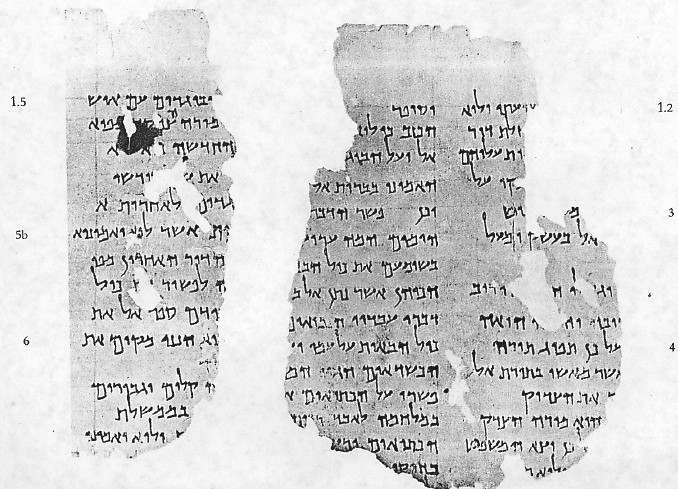
The Pesher to Habakkuk
Pages 2 and 3
Chapter 1:1-6

Only a small part of page 2 is able to be seen.Habakkuk 1:1
All of page 1 which would have been to the right of the lost portion contained verse one. It is lost.
Habakkuk 1:2
Only the last two words in line 1 of page 2 above correspond to words 4 and 5
in verse two. Part of the shin is missing. Notice that the negative velo' (and not) adds a waw.Habakkuk 1:3
Only three letters of this verse survive in line 5 above. The mem of the 4th word and the yod teth of the 5th word
Habakkuk 1:4
The first four words of this verse can be seen adjacent to the numeral 4 which marks the place of the verse in the pesher. Then some part of the verse (7 words) is lost in the lacuna with what would have been a pesher, but most of the rest of the verse, lacking one word, is found in the last three completely visible lines. Beginning with 'eth hatzadiyq, then the next contains what would have been in a pesher. There the words "hu' moreh hatsadiyq" means "he is the righteous teacher" the next line contains the rest of the verse through mishpat. The last word in the verse me-oo'qal (wrong) is missing in the lacuna.
Habakkuk 1:5
Verse 5 is split up by peshers and most of the verse was in the lacuna below page 2. The first word on line 1 on page 3 is the last word in verse 5 "ye-soopar" (it be told him). Then there is a lengthy pesher after which some of verse 5 is recorded again. The last two words after the marginal note 5b are lo' ta'amiynu' (you will not believe). Notice the Aramaic aleph added to the end of the verb.
Habakkuk 1:6
The marginal numeral 6 sites the line for verse 6. The first word in verse 6 is the first word to the left of the lacuna. It is kiy with the kaph missing and an aleph added to the yod which is common spelling in the scrolls. The verse continues through the partial finished word "hamar" and the r is missing in the lacuna. Notice the first two words in this line: the 1st is "Chaldeans" Heb. kasdi'ym which is spelled differently than the spelling in the Isaiah scroll which uses a double yod to indicate nationality. Here there is no double yod but an aleph is added before the yod to lengthen the spelling of this word. The next word is "goy" the usual spelling of goy is with an aleph in the body of the word in the Isaiah scroll. Notice that the verse is not continued to the left on this line but an end of paragraph is indicated and Peshru (they explain) is the first word in the next line. Part of the rest of this verse appears in the next page.
Return to Habakkuk Directory
Go Back to Moellerhaus Homepage